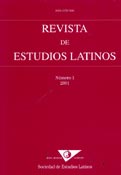History and rhetoric in the death of Agrippina (Tacitus, Annales XIV, 1-13)
DOI:
https://doi.org/10.23808/rel.v4i0.87935Keywords:
Tacitus; Aggrippina; Neron; historical causality; narration; rhetoric; passions; philosophie.Abstract
The narrative section on the death of Agrippina (Tac., Ann., XIV,1-13) is a striking example of Tacitus’ genius in suggesting the causes of historical events by a simple narrative link. It also shows how , with this historian, the narrative genre can easily «slip» into the demonstrative genre. In effect, developed around a very distinctive «narrative scheme» and rendered more expressive, particularly thanks to a choice of vocabulary which is noble and at times rare and poetic, and through the frequent recurrence of certain stylistic effects, his compositions reveal a clear influence from rhetoric, thus transforming the story into a real discourse looking to condemn Emperor Neron. To achieve this, Tacitus focuses on human causality, on human passions. In the final analysis, the verdict is unequivocal; based on a richly detailed psychological picture, Neron is portrayed as a man condemned, not only by men but also by nature and by the gods.
Downloads
Downloads
Published
How to Cite
Issue
Section
License
Copyright (c) 2004 Revista de Estudios Latinos

This work is licensed under a Creative Commons Attribution-NonCommercial-NoDerivatives 4.0 International License.
The originals published in the printed and electronic editions of this journal are the property of the Revista de Estudios Latinos and can be circulated as long as the original source and authorship is made clear in any reproduction, full or partial, of the same, and as long as this is not done for commercial purposes.






